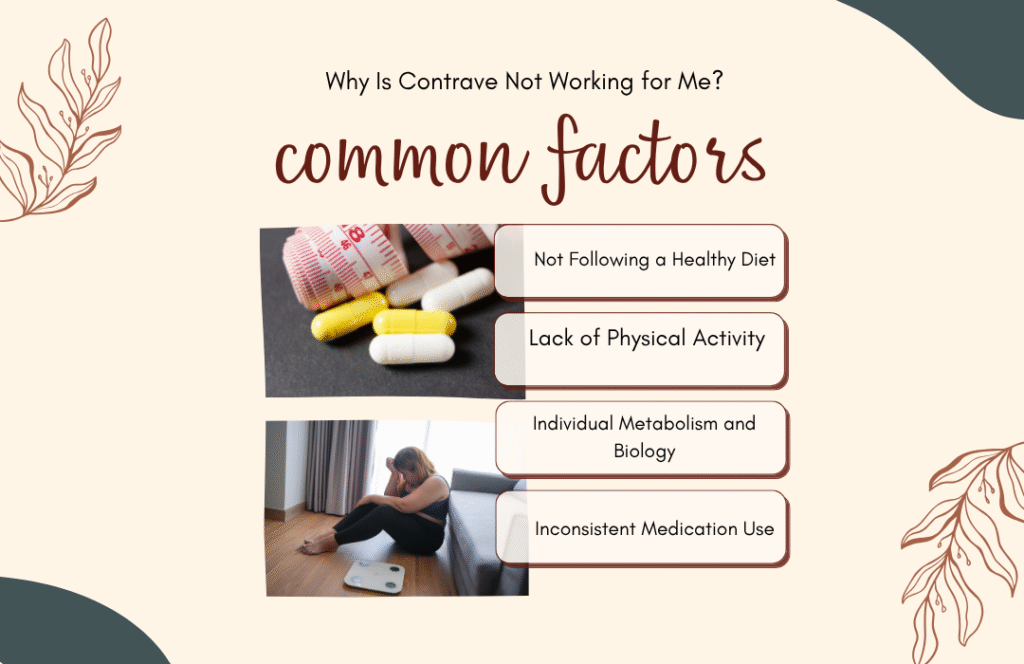Why is Contrave not working for you, even after weeks of commitment? You’re not alone in facing this frustrating question. While Contrave, an FDA-approved combination of naltrexone and bupropion, has helped many adults struggling with obesity or excess weight, others see little to no progress despite following the treatment plan. Understanding how Contrave works, why it may fall short for some users, and what you can do to improve its results is crucial for achieving lasting weight loss success. In this article, we break down the most common reasons Contrave might not be effective, explore its side effects, and share evidence-based strategies to help you get the most out of your treatment.
What Is Contrave Used For?
Contrave is primarily prescribed as part of a comprehensive weight management plan that includes dieting, exercise, and behavioral modifications. It’s approved by the Food and Drug Administration (FDA) for chronic weight management in adults with a body mass index (BMI) of 30 or higher (obesity), or 27 or higher with at least one weight-related condition like type 2 diabetes, hypertension, or dyslipidemia.
The active ingredients naltrexone and bupropion work together in the brain to affect appetite and reward pathways associated with eating behaviors. This dual-action mechanism helps reduce cravings and increase feelings of fullness, making it easier for patients to consume fewer calories and stick to a reduced-calorie diet.
How Does Contrave Work for Weight Loss?
Understanding how Contrave works can provide insight into why it might not be effective for everyone. The two main components of the medication function differently:
- Naltrexone: Originally used to treat alcohol and opioid dependence, naltrexone blocks opioid receptors in the brain. By doing so, it reduces the pleasure derived from eating high-calorie foods.
- Bupropion: An antidepressant and smoking cessation aid, bupropion affects neurotransmitters like dopamine and norepinephrine. It helps regulate mood and appetite while increasing energy levels and alertness.
Together, these medications are believed to influence the hypothalamus part of the brain responsible for hunger regulation-and the mesolimbic dopamine system, which controls reward and motivation. The net effect is decreased food cravings and improved impulse control around eating.
Why Is Contrave Not Working for Me?

There are several potential reasons why Contrave may not be yielding the expected weight loss results. Below are the most common factors that could be influencing your experience:
1. Not Following a Healthy Diet
Contrave is not a magic pill- it must be used alongside a reduced-calorie, nutritionally balanced diet. If you’re still consuming empty calories, processed snacks, or large portions of junk food, the medication won’t compensate for poor dietary choices.
For example, if you’re still indulging in late-night pizza or sugary desserts during dinner or bedtime snacks, you’re likely consuming more calories than your body needs. Even with appetite suppression, overeating will hinder progress.
2. Lack of Physical Activity
Exercise plays a crucial role in any weight loss strategy. While Contrave may help curb appetite, it does not replace the need for regular physical activity. Incorporating both aerobic exercise and strength training into your routine helps burn fat, build muscle, and boost metabolism.
A sedentary lifestyle-even with medication-can stall weight loss. Consider integrating activities like walking, cycling, gym workouts, or even yoga into your daily schedule.
3. Individual Metabolism and Biology
Everyone’s body responds differently to medication. Some individuals may have a genetic predisposition or hormonal imbalances that make weight loss more challenging. Factors like metabolism, insulin resistance, or thyroid function can all play a role in how well Contrave works.
Additionally, emotional eating or stress-induced binge eating can override the appetite-suppressing effects of Contrave, especially if coping mechanisms aren’t in place.
4. Inconsistent Medication Use
Taking Contrave inconsistently or missing doses can significantly impact its effectiveness. The medication builds up in the system over time, and skipping pills disrupts this balance. It’s important to follow the prescribed dosage and timing instructions provided by your health care provider.
Also, some people stop taking the medication prematurely due to side effects without consulting their doctor. It’s essential to communicate with your health professional before discontinuing treatment.
5. Psychological and Emotional Factors
Mental health plays a significant role in weight management. Conditions such as depression, anxiety, or emotional eating can interfere with weight loss efforts. Bupropion, one of the components in Contrave, has antidepressant properties, but it may not be sufficient for individuals with severe mental health concerns.
In such cases, additional therapy or psychiatric support may be necessary to address underlying issues affecting weight loss.
How Much Weight Can You Lose with Naltrexone/Bupropion?
Clinical trials show that on average, individuals taking Contrave lose about 5–10% of their initial body weight within a year, especially when combined with lifestyle changes. However, individual results vary widely.
Some people may only lose a few pounds, while others may see significant reductions in adipose tissue and overall body mass. The key is consistency who stick with the program and maintain healthy habits tend to see better outcomes.
It’s also worth noting that weight loss tends to plateau after several months, which is normal. Adjustments to diet, exercise, or medication may be needed to continue seeing progress.
Do Side Effects of Contrave Go Away?
Like many medications, Contrave comes with a range of possible side effects . The most commonly reported include:
- Nausea – Often occurs during dose escalation; usually improves over time.
- Headache – May result from neurological adjustment or dehydration.
- Constipation – Slowed digestion is a frequent issue; fiber and hydration help.
- Dizziness – Common during early stages; avoid sudden position changes.
- Dry Mouth – Can be managed by staying hydrated and using oral rinses.
- Insomnia – Bupropion component may disrupt sleep; avoid late-day dosing.
- Increased Blood Pressure – Monitor regularly, especially if hypertensive.
Many of these side effects are mild and tend to diminish over time as the body adjusts to the medication. However, some people may experience persistent or severe reactions.
Low Dose Naltrexone Side Effects and Weight
Some individuals use low-dose naltrexone (LDN) off-label for various health conditions, including autoimmune disorders and chronic pain. While LDN may have fewer side effects than standard doses, its impact on weight is less clear.
Unlike Contrave, which combines naltrexone with bupropion specifically for weight loss, low-dose naltrexone isn’t typically associated with significant weight changes. Some anecdotal reports suggest it may help with inflammation or metabolic regulation, but more research is needed.
Tips on Taking Contrave Effectively
To get the most out of Contrave, consider the following strategies:
1. Follow the Prescribed Dosage Schedule
Start with the lowest dose and gradually increase as directed by your healthcare provider. This helps minimize side effects and allows your body to adjust.
2. Take It with Food
Taking Contrave with meals can reduce gastrointestinal discomfort like nausea or stomach upset.
3. Stay Hydrated
Drinking plenty of water supports digestion, metabolism, and overall health. Aim for at least 8 glasses per day.
4. Monitor Your Sleep
Some users report sleep deprivation, nightmares, or insomnia. Try to take the medication earlier in the day and establish a consistent sleep routine.
5. Pair It with a Healthy Lifestyle
No medication replaces the importance of a healthy diet, regular physical activity, and good sleep hygiene. Focus on whole foods, lean proteins, vegetables, and complex carbohydrates.
Avoid high-sugar snacks, excessive alcohol consumption, and late-night eating, which can sabotage weight loss.
When to Talk to Your Doctor
If you’ve been taking Contrave consistently for several weeks and haven’t seen any improvement, or if side effects are intolerable’s time to consult your health professional.
Your doctor may recommend:
- Adjusting the dosage
- Trying a different anti-obesity medication
- Addressing other health conditions that may be interfering with weight loss
- Referring you to a registered dietitian or therapist for additional support
Never stop taking Contrave abruptly without medical advice, as it can lead to withdrawal symptoms or rebound weight gain.
Other Considerations: Safety and Long-Term Use
Contrave carries a boxed warning regarding the risk of suicidal thoughts and seizures, particularly in individuals with a history of mental health conditions or seizure disorders. It should not be taken with certain medications, including monoamine oxidase inhibitors (MAOIs) or other opioids.
Long-term use requires careful monitoring by a healthcare provider to ensure safety and efficacy. Regular check-ins can help track progress, manage side effects, and make necessary adjustments to your treatment plan.
Final Thoughts: Managing Expectations with Contrave
Weight loss is a complex process influenced by numerous biological, psychological, and environmental factors. Contrave is a tool not a cure and its success depends largely on how well it integrates into your overall lifestyle.
If you’re wondering, “Why is Contrave not working?”, ask yourself whether you’re fully committed to the accompanying lifestyle changes. Are you getting enough exercise? Are you prioritizing nutritious meals over junk food? Are you managing stress effectively?
Remember, sustainable weight loss takes time, patience, and persistence. With the right mindset, support system, and guidance from a qualified health professional, Contrave can be an effective ally in your weight management journey.
Frequently Asked Questions
How long does it take for Contrave to start working?
Most people begin noticing appetite suppression and reduced cravings within the first week. Significant weight loss typically occurs over several months.
Can I drink alcohol while taking Contrave?
Alcohol can interact with bupropion and increase the risk of seizures. It’s generally advised to avoid or limit alcohol consumption while on this medication.
Is Contrave covered by insurance?
Coverage varies by plan. Some insurers require prior authorization, while others may not cover it at all. Check with your provider or explore discount programs, such as Optum Perks or RVO Health.
Can I take Contrave if I have a history of depression?
Contrave contains bupropion, which is an antidepressant. However, it carries a boxed warning for increased risk of suicidal thoughts. Always discuss your mental health history with your doctor.
What happens if I miss a dose?
Take the missed dose as soon as you remember, unless it’s close to your next scheduled dose. Never double up to make up for a missed pill.
If Contrave isn’t delivering the results you expected, it may be time to explore a more personalized approach. At Diamond Aesthetics, we offer medically supervised weight management programs that combine prescription treatments, such as Contrave, with lifestyle coaching, nutritional support, and ongoing medical oversight, ensuring your plan is safe, effective, and tailored to your body’s unique needs.


